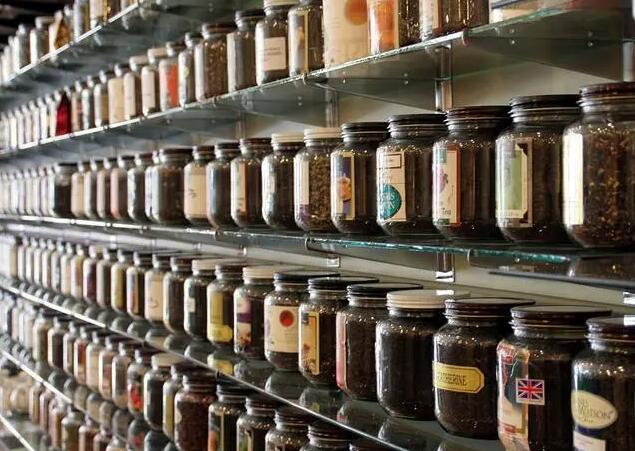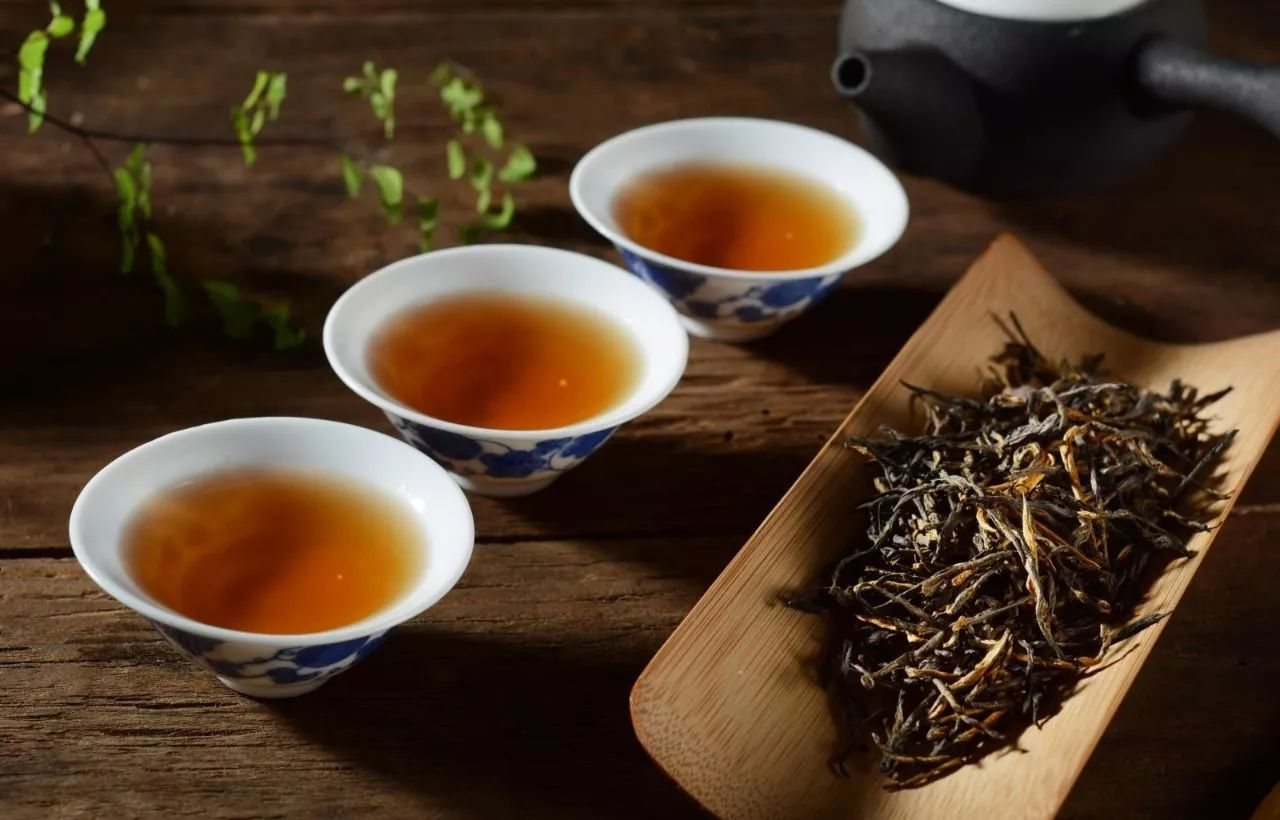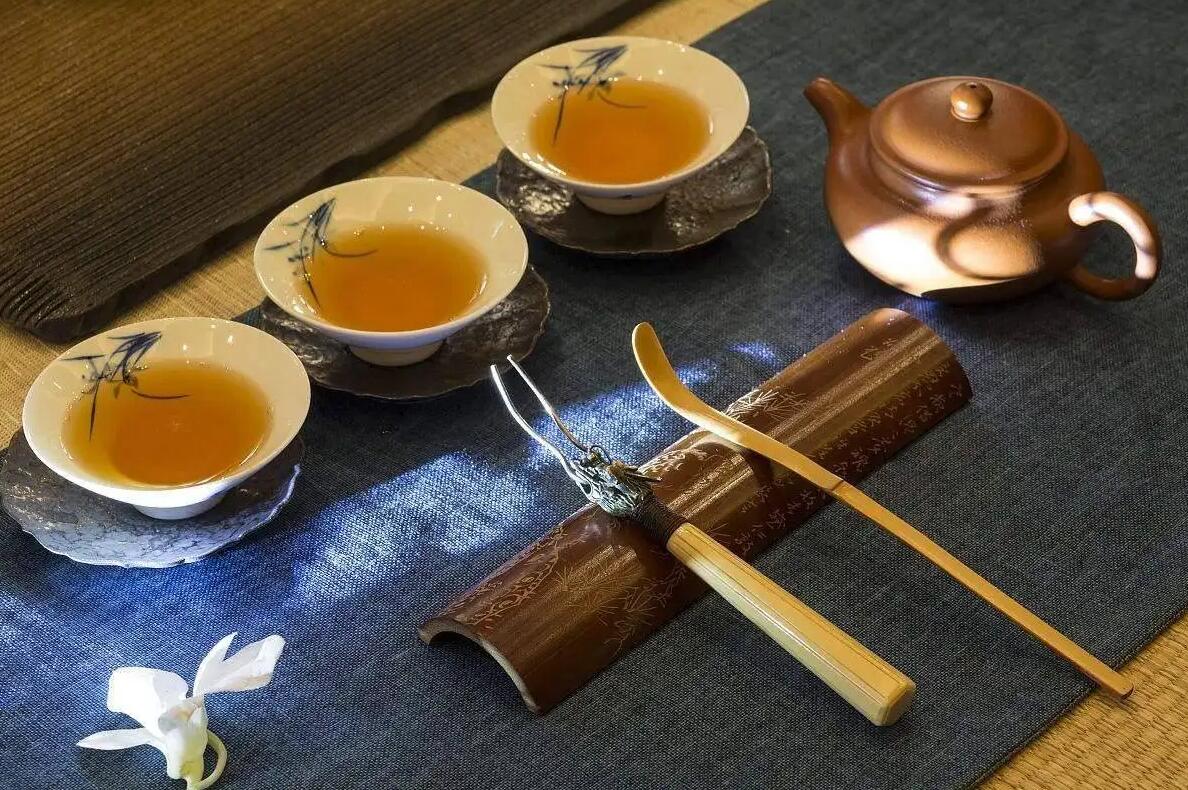Each nation has its own unique cultural system and individual characteristics. Great differences exist in the orientation of culture and values between the East and West. The West advocates fire and power, while China is characterized as peaceful, gentle and kind, firm and tenacious. These qualities are fully shown in the golden mean and harmony, the characteristics of Confucian thoughts Tea, which is gentle and peaceful, accords with these characteristics. Though Taoism and Buddhism have played important roles in the development of tea culture, Confucian thought is regarded as the core of the spirit of Chinese tea ceremony, which is demonstrated in the following four aspects.
Tea's Gentle and Peaceful Characters Embody the Gulden Mean of the Confucian School
It is said that Westerners are open and enthusiastic,and their dispositions are like wine, while we Easterners, sober, sensible, gentle and enduring, are like tea. We also advocate getting along with each other in a friendly and harmonious way. Therefore, Westernars stress individual struggle; easterners, collectivism. Eastern attributes in Chinese tea culture prominently reflects. We should get along with each other just as man and nature should be in harmony. The Confucianists introduced this thought into tea ceremony, advocating the creation of a harmonious atmosphere through the drinking of tea. The characteristics of tea and water are similar: though it seems to be delicate, water is very magnanimous; though tea is only an ordinary drink, people will learn to be tolerant and understanding through drinking it. Therefore, in ancient times, imperial courts entertained foreign envoys with tea, while in modern times, people still offer tea to guests to express their friendliness and to strengthen solidarity. In China, tea parties are held in institutions and factories at the end of a year. At these parties, managers drink tea together with staff, and have heart-to-heart talks to get to know each other's viewpoints better and to express their solicitude and understanding. Many disagreements can be solved at such parties.
The Confucianists advocated the golden mean: that is, people should approach problems from all angles so as not to go to extremes. The mean was highlighted in tea culture. Although water land fire seem to be incompatible, Lu Yu stressed their unitarity, How could one boil water without fire? And how could a person make tea without water? Therefore, Lu Yu moulded wind animals, fire birds, fish and water on teapots, showing the unitarity of wind, fire and water. Fire is fanned by wind, water boiled by fire, and tea brewed by water. Lu Yu's viewpoint originated from the Book of Changes"first of the five books." According to it, wind was xun; fire, li; and water, kan . The fire could only burn vigorously when wind blew under the teapot. Xun and li were jointly called ding, which could brew food and drink. fire and water were jointly called jiji, expressing the idea that everything was ready. Fire rises while water falls. However, Chinese people exchange their positions. Our social ideal is to realize universal harmony in the world; Nature is made up of gold, wood, water,, fire and earth, ,which are called "the five elements," and "harmonious five elements" is our conception of nature. Lu Yu advocated tea culture, and believed that the state would be unified only if people got along with each other harmoniously, and diseases would be eliminated only if the five elements were harmonious.
Under the guidance of such thoughts, the spirit of solidarity and harmony is carried out in each link of tea culture. The Painting of 100 Children drawn by Su Hanchen depicted 100 lovely children drinking tea while playing, symbolizing that all Chinese ethnic groups get along with each other. Tea experts express the thought through a tea set. People call teapot "tea mother,"and teacups"tea son," showing that our motherland cares for each of her children. In the Qing Dynasty, Chen Mingyuan made a teapot,, whose body was made of the tightly-bounded roots of three old trees. The teapot shared three roots, a pot of water and a lid, expressing the idea that "it is impossible to break 10 pairs of chopsticks simultaneously," and that all ethnic groups of China were linked together by the same root. The Chinese regard it as the spirit of tea culture that man's nature is good at birth. People all over the world may draw inspiration from tea culture to improve their relations.
Chinese Tea Ceremony Is a Happy Cultural Activity
The Japanese tea ceremony mainly absorbed the elements of Buddhist thought in Chinese tea culture, and stressed bitterness and quietness. Chinese tea culture, however, is full of happiness, for it fully absorbed the magnanimous Confucian outlook on life.
The Chinese believe in pantheism, and regard all mortals that have made contributions to mankind as gods after they die. In other words, Chinese gods are phantoms of mortals, so we believe in the self-perpetuating strength of mankind. As history should place our hopes on the later generations to fulfill unaccomplished aims. We are always confident in the future, and pave a deep love for life. Therefore, in the Chinese tea ceremony, imperial concubines and princesses in the imperial palace could drink tea by Yixing Mugs while appreciating music; scholar, drink tea while playing musical instruments, painting, chanting poems or appreciating beautiful natural scenery. Tea-drinking was also a happy family occasion Even monks took pleasure in drinking tea. Jiao Ran, a famous monk of the Tang By nasty, who was a friend of Lu Yu helped to create Chinese tea culture with Lu Yu and other scholars, Instead of stressing strict ascetic practices, he advocated drinking tea while appreciating fragrant flowers, the bright moon and beautiful music, which was full of the human touch. He was also a famous poet, and often composed poems in reply to friends at tea parties.
The Chinese believe that bitterness will not last long, and creates an excellent opportunity for people to temper themselves. As nature is always in motion, and human life goes on without end, we should be optimistic. We drink tea to develop our vital spirit, and help others generously. The melody of the spirit of Chinese tea ceremony is composed of the sober, optimistic, enthusiastic, connected and tolerant spirit of the Confucian School.
Cultivate One's Honesty, Elegant Taste and Active Attitude Towards Life with the Spirit of Tea
Some people misunderstood tea as a time-killer for idlers and hermits. During the Ming and Qing dynasties, many tea connoisseurs were pessimistic. At the end of the Qing Dynasty, people of the "Eight Banners" regarded tea as a plaything. However, one can realize that the active Confucian spirit has been the main trend of tea culture if he takes a panoramic view of the history of tea culture, Chinese intellectuals have a strong sense of responsibility and vocation, and always "regard it as their own responsibility to concern themselves with world affairs," and "plead for the people."Chinese tea culture absorbed this fine tradition. As far back as the Eastern and Western Jin, and the Southern dynasties,Lu Na,Huan Wen and several other politicians created the early tea culture, advocating the cultivation of one's honesty with tea - Idle talkers commented freely worldly affairs while drinking tea with Japanese tea cup. Lu Yu formally created the system of Chinese tea culture in the Tang Dynasty, synthesizing Confucian, Taoist and Buddhist thought, with the Confucian active attitude towards life as the guiding principle. Lu Yu was concerned about his country and his people. The chaos caused by the rebel leader. An Lushan, had just been put down when Lu Yu made tea stoves - He was taking refuge in Huzhou City and the good tidings that the country had become stable filled him with joy. He carved the words: "made in the Ming Reign when the Great Tang defeated Hu'" on the stoves. Yan Zhenqing, ,with whom he studied tea culture, was a famous calligrapher and politician. An Lushan launched armed rebellions in the north, and soon led his troops to the south. The prefectures of Hebei fell successively; only Yan Zhenqing kept Pingyuan Prefecture, as his battle field. When he was the Minister of the Ministry of Punishment, he offended the emperor and prime minister by using blunt words to remonstrate with them, and was demoted to Huzhou City, where he became acquainted with Lu Yu. We can see, therefore, the founders of tea culture all had a strong sense of responsibility to their country and people. The boiler made by Lu Yu had a square handle,,symbolizing honesty; wide edges, lofty ideals; and a long lower part, the golden mean. Most of the tea connoisseurs maintained the fine tradition of reflecting the principles of administering a country through specific tea sets. In the middle and later periods of the Ming Dynasty, most of the emperors were fatuous and self-indulgent; the tea connoisseurs |therefore paid special attention to cultivating integrity by not associating themselves with undesirable elements. They wrapped stoves with bamboo and called them kujiejun (Mr. Painstakmg Integrity), suggesting that they would learn from the progressive quality of bamboo. The steelyard used for measuring tea was called zhiquan. Quart was a part of an ancient weighing apparatus-the sliding weight of a steelyard. One small tea set showed the standard of measuring right and wrong, indicating that tea connoisseurs [could distinguish truth from falsehood. Confucianists encourages the cultivation of one's moral character and putting one's family affairs in order, and then administering state affairs. However, Instead of always keeping a straight face to show concern about the country, one should "alternate tension with relaxation, which was the principle of kings Wen and Wu."Therefore, it should not be of measuring right and wrong, indicating that tea connoisseurs could distinguish truth from falsehood. Confucianists encourages the cultivation of one's moral character and putting one's family affairs in order, and then administering state affairs. However, instead of always keeping a straight face to show concern about the country, one should "alternate tension with relaxation, which was the principle of kings Wen and Wu." Therefore, it should not be regarded as negative behavior for some tea connoisseurs to have brewed and sample tea in the wilderness.
Tea Ceremony Served as a Rite
China has always been known as a land of propriety and righteousness. Modem people often mistake the rite system for the social estate system. Confucian rites not only restrained peopled's behavior and established social order, but they also implied mutual respect and care and the virtues of showing respect for the aged and love for the young, the comity between brothers, respect for teachers and love for students. People become sober and sensible through drinking tea, and as a result, ,they can carry out the spirit of the rites easily.
Tea was first served during rites in the Song Dynasty- At that time, the tea ceremony was used on the grand feasts held by the court in spring and autumn. The details were recorded in the History of the Song Dynasty. Tea would be "granted" when imperial competitive examinations were held, when the emperor interviewed officials and received foreign envoys, and on the memorial ceremonies of various holidays. Ethnic minorities were also affected by the system. At first, the State of Liao and Song imperial court confronted each other, and fought many battles. According to the treaty concluded after they became sworn brothers at Tanyuan Pool, they sent envoys to each other. A tea ceremony was held when the Song imperial court received the envoy from the State of Liao, and also at a send-off party. Though the State of Liao was founded by Qidan, the nomandic people, they appreciated the rite system of the Song Dynasty. Many details about the tea ceremonies held on the birthdays of the emperor and queen mother, when offering a sacrifice to mountains, worshiping the sun, or on other important occasions were recorded in the History of the State of Liao.
According to Volume 115 of the History of the Song Dynasty, when a prince took an imperial concubine, he had to offer 100 jin of tea and other presents. Later, it became customary to hold tea ceremonies at weddings. The rites of tea-drinking originated from Buddhism, which later affected families and society- The Family Rites written by Qiu Jun in the Ming Dynasty provided the details of tea ceremony, which greatly affected the common people, and spread to Korea. South Korea has paid great attention to tea ceremony even to today.



